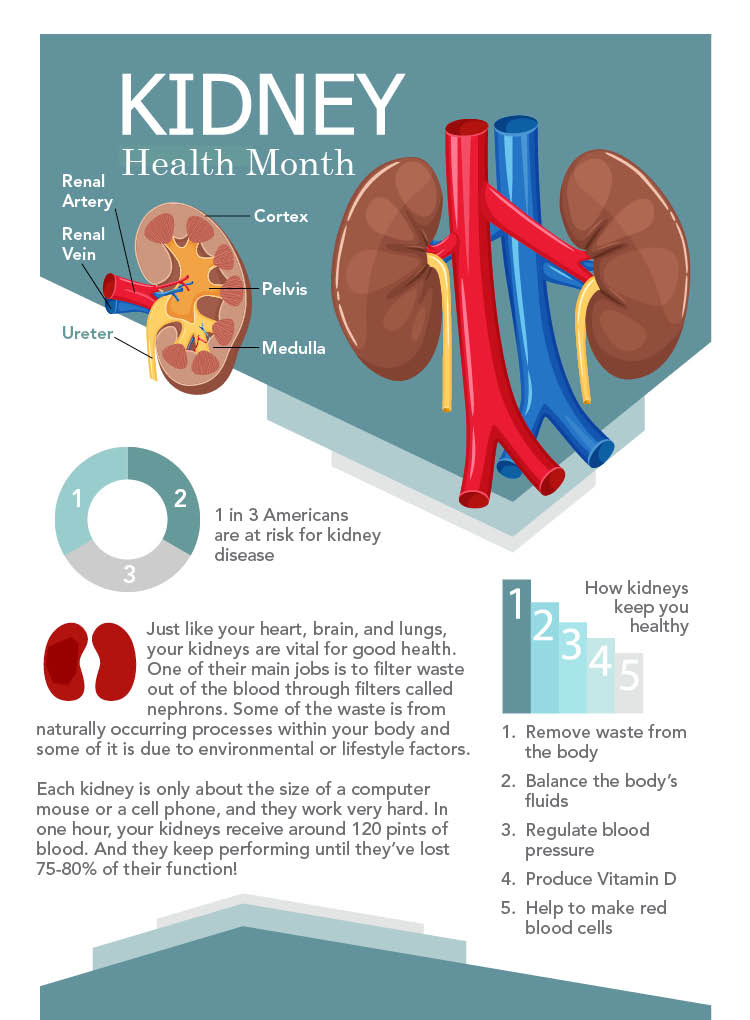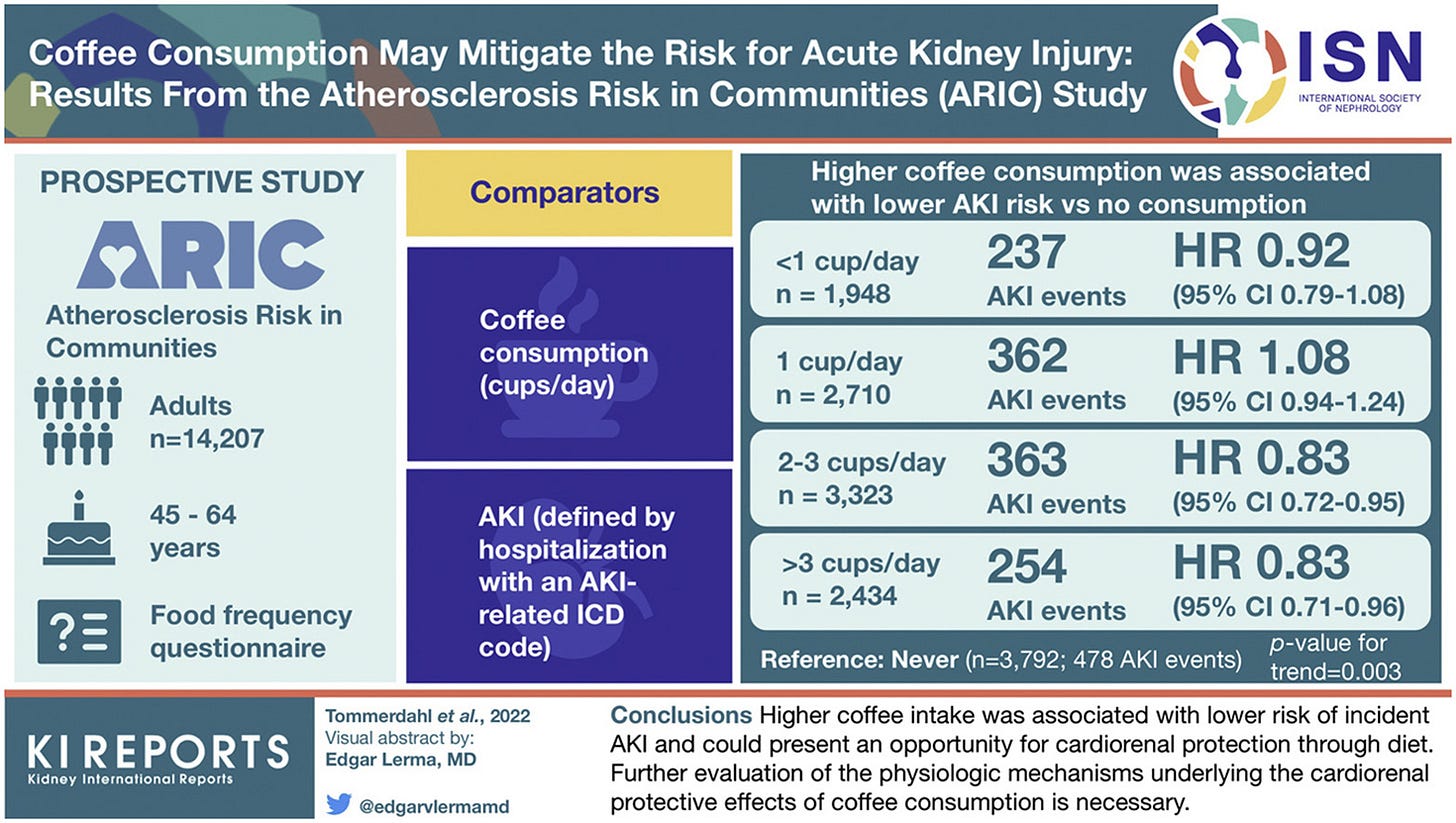My recent newsletters featured water, ion and amino acid transporters which brought to mind that master organ for such, our kidneys. They deserve to be featured and voila, here is their newsletter.

Coffee is Kidney Kind
Once again we find that coffee consumption is beneficial. In the case of kidneys, coffee can protect them when they are acutely injured. Those who drank any quantity of coffee every day had a 15% lower risk of Acute Kidney Injury; the largest reductions occurred with those who drank two to three cups a day (a 22%–23% lower risk).
The mechanism of action for this risk reduction? It may be that either caffeine itself or any of its biologically active metabolites combine with caffeine to improve perfusion and oxygen utilization within the kidneys, leading to good kidney function and tolerance to AKI. [However, caffeine induced dehydration from diuresis could increase stone formation… stay hydrated.]
Go Nuts for Good Health
Scientists analyzed data from 6,072 individuals (aged ≥ 20 years) who participated in the National Health and Nutrition Examination Survey from 2003–2006. They found that nuts consumed 1–6 times per week was associated with a lower prevalence of Chronic Kidney Disease (CKD). Even higher nut consumption was associated with lower all-cause and cardiovascular mortality in the non-CKD population. The correlations held for the CKD population, as well.
The protective effect of nuts on reducing the risk of CKD and partly reducing all-cause mortality? May be due to reducing inflammation and improving lipid metabolism disorders, hypertension, and bowel health.
Mom told you, “Eat Your Vegetables”! She was right.
Researchers analyzed data on eating patterns of fruits and vegetables from three cycles of the National Health and Nutrition Examination Survey conducted between 1988 and 2018. Adults with chronic kidney disease generally ate fewer fruits and vegetables than adults who did not have the disease. Of course, it is correlative and cannot determine whether the low intake of fruits and vegetables is a cause or result of chronic kidney disease.
What about Kidney Stone Formation?
Kidney stone formers should eat diets enriched with foods high in calcium and potassium in order to prevent those painful recurrent kidney stones.
ABSTRACT We prospectively recruited 411 local incident symptomatic kidney stone formers (medical record validated) and 384 controls who were seen at Mayo Clinic in Minnesota or Florida between January 1, 2009, and August 31, 2018. Dietary factors were based on a Viocare, Inc, food frequency questionnaire administered during a baseline in-person study visit. Logistic regression compared dietary risk factors between incident symptomatic stone formers and controls. Incident stone formers were followed up for validated symptomatic recurrence in the medical record. Cox proportional hazards models estimated risk of symptomatic recurrence with dietary factors. Analyses adjusted for fluid intake, energy intake, and nondietary risk factors.
RESULTS In fully adjusted analyses, lower dietary calcium, potassium, caffeine, phytate, and fluid intake were all associated with a higher odds of an incident symptomatic kidney stone. Among incident stone formers, 73 experienced symptomatic recurrence during a median 4.1 years of follow-up. Adjusting for body mass index, fluid intake, and energy intake, lower dietary calcium and lower potassium intake were predictive of symptomatic kidney stone recurrence. With further adjustment for nondietary risk factors, lower dietary calcium intake remained a predictor of recurrence, but lower potassium intake only remained a predictor of recurrence among those not taking thiazide diuretics or calcium supplements. - A Chewcharat et al.
Banana smoothies anyone?

Getting molecular to thwart fibrosis
Scientists recently reported a new breakthrough: if the transporter of signaling molecule Sphingosine-1-phosphate is blocked, the progression of kidney fibrosis is suppressed.
CKD’s sustained inflammation leads to progressive fibrosis and eventually to end-stage kidney disease. Sphingosine 1-phosphate (S1P), a product of sphingolipid catabolism, is involved in many cellular functions. Drugs targeting S1P signaling are in the development. The primary mechanism of most of these drugs is functional antagonism of S1P receptor-1 (S1P1) expressed on lymphocytes and the resultant immunosuppressive effect. The signaling axis involving sphingosine 1-phosphate (S1P) in kidney perivascular cells leads to increased proinflammatory cytokine production after injury in vitro and in mouse models of kidney disease.
Here, we documented the role of local S1P signaling in perivascular cells in the progression of kidney fibrosis using primary kidney perivascular cells and several conditional mouse models. S1P was predominantly produced by sphingosine kinase 2 in kidney perivascular cells and exported via spinster homolog 2 (Spns2). It bound to S1P1 expressed in perivascular cells to enhance production of proinflammatory cytokines/chemokines upon injury, leading to immune cell infiltration and subsequent fibrosis. A small-molecule Spns2 inhibitor blocked S1P transport, resulting in suppression of inflammatory signaling in human and mouse kidney perivascular cells in vitro and amelioration of kidney fibrosis in mice. Our study provides insight into the regulation of inflammation and fibrosis by S1P and demonstrates the potential of Spns2 inhibition as a treatment for CKD and potentially other inflammatory and fibrotic diseases that avoids the adverse events associated with systemic modulation of S1P receptors. -S Tanaka et al.

This research comes out of a mouse model of kidney fibrosis. But it may apply to other diseases, such as scleroderma or IPF, that involve ‘over-scarring’ as well. Next steps: test oral formulations of the drug candidates in phase I clinical trials.
REFERENCES
https://biomedworks.substack.com/p/treating-bradyarrhythmias-without
KL Tommerdahl et al, Coffee Consumption May Mitigate the Risk for Acute Kidney Injury: Results From the Atherosclerosis Risk in Communities Study, Kidney International Reports (2022). DOI: 10.1016/j.ekir.2022.04.091
Koushu Wang et al, Nut Consumption and Effects on Chronic Kidney Disease and Mortality in the United States,American Journal of Nephrology (2022). DOI: 10.1159/000524382
Eating more fruits and veggies could benefit your kidneys (2022, July 26) https://medicalxpress.com/news/2022-07-fruits-veggies-benefit-kidneys.html
A Chewcharat et al. Dietary Risk Factors for Incident and Recurrent Symptomatic Kidney Stones, Mayo Clinic Proceedings (2022). DOI: 10.1016/j.mayocp.2022.04.016
S Tanaka et al. Sphingosine 1-phosphate signaling in perivascular cells enhances inflammation and fibrosis in the kidney, Science Translational Medicine (2022). DOI: 10.1126/scitranslmed.abj2681





Omega 3 fatty acids in seafood linked to lower risk of chronic kidney problems
Association of omega 3 polyunsaturated fatty acids with incident chronic kidney disease: pooled analysis of 19 cohorts, The BMJ (2023). DOI: 10.1136/bmj-2022-072909